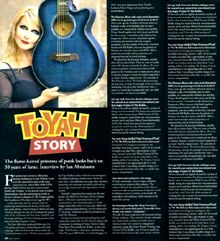 Toyah Story Toyah StoryThe
flame-haired priestess of punk looks back on 30
years of fame. Interview by Ian Abrahams
Few artistes have moved so effortlessly between
mediums as Toyah Willcox. As an actor she
appeared in some of the most important
pop-culture films of the 1970s, playing 'Mad' in
Derek Jarman's controversial Jubilee
and 'Monkey' in the seminal mod-revivalist Quadrophenia,
but also performing in works as diverse as
Jarman's adaption of The
Tempest and the final
instalment of the Quatermass
saga for ITV.
At the same time, she released a slew of records
that moved from the ferocity of her early
post-punk albums, Sheep
Farming In Barnet and The
Blue Meaning, through the
peak of her commercial appeal, with the It's A
Mystery led Four From Toyah
EP, and her image-defining LP Anthem,
hitting numbers four and two in their respective
charts...
Let’s
go back. You were already making a name for
yourself as an actress when you released your
first single, Victims Of The
Riddle…
All the early stuff was slighly dictated by my
lack of being an actual musician. I’m always
very instinctive; I know what I want to hear.
With Victims Of The Riddle, I sang the vocals
before any instrumentation was put down, and then
(Blood Donor keyboardist) Keith Hale created the
tune and the sequences around the vocal. I love
the whole accident of working that way; it
creates the emotional intentions before you get
the musical honing.
You
were being labelled ‘High Priestess of Punk’
in ‘79, ‘80. Did you feel connected to
that scene?
I remember it as being very exciting but also
incredibly frustrating, because I didn’t fit
the mould. It’s hard to say that I felt a
part of punk, or new wave, because I never did.
When Victims Of The Riddle was number one in the
indie charts I was making Jubilee, I was making
The Tempest, I was in Quadrophenia, I was
appearing at the ICA with Anthony Sher. I was
doing incredible things. So I think people found
me either fake, or couldn’t put me in a
compartment.
But
listening to things like Sheep
Farming In Barnet, you
transcended punk. Tracks like Neon
Womb were almost ‘Cyberpunk’!
Oh yeah! All those songs were well-practiced in
front of large audiences.
They
started in Sunday rehearsals and sound checks and
then we’d play them asencores, so they were
created in a heightened experience. Songs like
Neon Womb, Waiting, Ieya, Victims Of The Riddle,
even if I say so myself, are absolute classics
because they were created with the audience. They
were very shamanistic and our concerts used to
just accelerate out there to the point where I
used to look out and think, ‘God, we’re
like Masai warriors dancing until we’re no
longer aware of who we are.’
Anthem
was huge, and very commercial, but its follow-up,
Changeling,
is dark.
Changeling was a reaction because I wasn’t
ready to write. I wanted to work with Steve
Lillywhite but the relationship just didn’t
work because I should have had another six or
twelve months to address the album. It was all
written in the studio. I think it’s a good
album, it says something very powerful. But it
was a painful album and a very painful period in
my life where I just had to move back into
acting, which was Trafford Tanzi.
*Extracts
from the interview. This issue can be ordered
from www.recordcollectormag.com
from their back issues section, priced £4.90.
Record Collector
January 2010
|